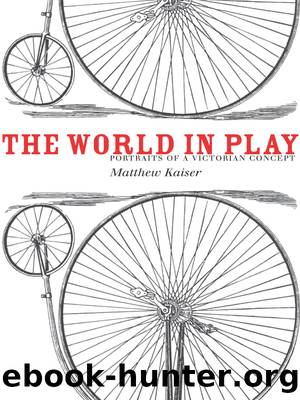The World in Play by Matthew Kaiser

Author:Matthew Kaiser
Language: eng
Format: epub
Publisher: Stanford University Press
Published: 2012-02-14T16:00:00+00:00
The Modern Ideology of Child Play
Before turning our attention to the cosmological features of Brontëâs future-negating model of child play, to the tension between the profane logic of play as paideia and the sacred logic of play as fate, I would like to take the opportunity here to place Brontëâs idiosyncratic views on child play in historical context, to provide an account of the evolution of the modern ideology of child play over the last four centuries. How did the modern ideology of child play come to saturate Victorian representations of childhood? Why is it so difficult for us to separate child play conceptually from the logic of play as paideia? Why do âWesternersâ in particular, Sutton-Smith notes, have a tendency to âcherishâ the notion that children âadapt and develop through their playâ?46 From middle-class common sense, through modern pedagogy, to early expressions of evolutionary psychology: Brontë confronts them all in her struggle to achieve critical distance from the all-encompassing modern ideology of child play. She shakes the normalizing foundations of modern consciousness and causes the cosmic vault to collapse upon her head. In the pages that follow, I explore the historical vicissitudes not of actual child play, which routinely subverts cultural expectations, but of its representations in pedagogical discourse over the last four centuries. It is against this backdrop that Brontë unleashes Heathcliff and Cathy.
We should resist the urge to project onto ancient and premodern child play prelapsarian authenticity. The belief that child play socializes children and trains them to be productive citizens is ubiquitous in educational treatises in early and late antiquity. In Latin, ludus mean âschoolâ as well as âplayâ and âgame.â The Roman ludus is a site of physical and mental exercise, an institution of ludic development. Unlike modern educationalists, however, ancient pedagogues make no attempt to obfuscate the coercive, prescriptive quality of the ludic regimen to which children are subjected. Greek and Roman tutors compel productive and socially viable play in their pupils. In The Republic, Plato views the childish will to play as a mimetic impulse, which can and should be harnessed by a âsystemâ of musical training and gymnastics for purposes of producing âwell-conducted and virtuous citizens.â47 It is an impulse, however, which can just as easily be channeled by irresponsible guardians, or by âpantomimic gentlemen,â toward less virtuous ends:
And when [children] have made a good beginning in play, and by the help of music have gained the habit of good order, then this habit of order, in a manner how unlike the lawless play of the others! will accompany them in all their actions and be a principle growth to them, and if there be any fallen places in the State will raise them up again.
From antiquity to the early modern period one sees the indelible handprint of a teacher, tutor, or mentor on the productive play of children. Although debates about when the modern childâand by extension the modern ideology of child playâfirst emerged are far from settled, when it comes
Download
This site does not store any files on its server. We only index and link to content provided by other sites. Please contact the content providers to delete copyright contents if any and email us, we'll remove relevant links or contents immediately.
Einstein: His Life and Universe by Walter Isaacson(1332)
Finding Freedom: Harry and Meghan and the Making of a Modern Royal Family by Omid Scobie & Carolyn Durand(1186)
Promised Land (9781524763183) by Obama Barack(1161)
Compromised by Peter Strzok(1076)
Finding Freedom by Omid Scobie(1067)
JFK by Fredrik Logevall(1008)
Freedom by Sebastian Junger(649)
Salford Lads: The Rise and Fall of Paul Massey by Bernard O'Mahoney(593)
The Russia House by John Le Carré(572)
Kremlin Winter by Robert Service(537)
Day of the Dead by Mark Roberts(524)
Graveyard (Ed & Lorraine Warren Book 1) by Ed Warren & Lorraine Warren & Robert David Chase(514)
A World Ablaze by Craig Harline(513)
Flying Tiger by Samson Jack(510)
Joe Biden: American Dreamer by Evan Osnos(500)
100 Things Successful Leaders Do by Nigel Cumberland(482)
Melania and Me: The Rise and Fall of My Friendship With the First Lady by Stephanie Winston Wolkoff(482)
The Irish Buddhist by Alicia Turner(481)
The Mission by David W. Brown(467)
